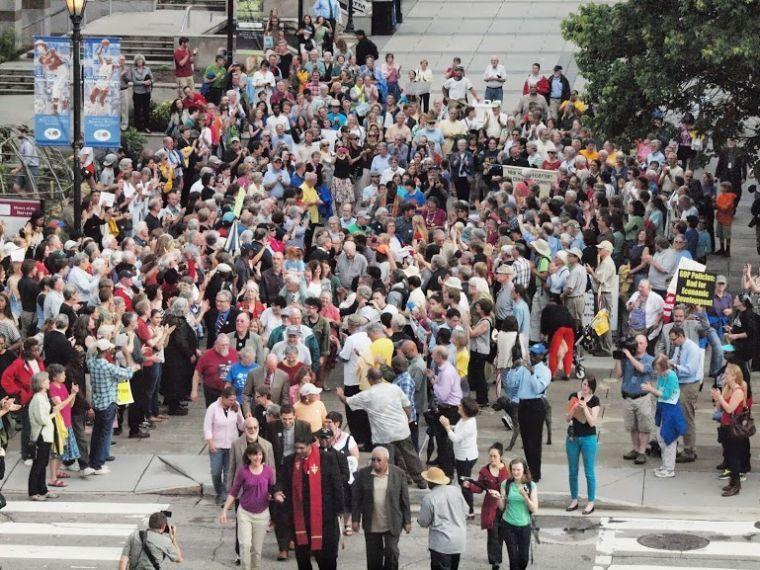One-hundred-fifty-eight non-violent protesters have been arrested in the past month—each for protesting the great number of conservative legislation introduced in the North Carolina General assembly recently.
Moral Monday is a weekly protest of right-wing legislation. The demonstrations are spearheaded by the North Carolina chapter of the NAACP.
Protests began the week leading up to the first Moral Monday on May 6, and the number in attendance—and arrested—is increasing.
Bryan Perlmutter, a recent graduate in business administration at N.C. State was arrested on April 29 for protesting in the General Assembly. Since then, he has continued to protest, carefully, on Moral Mondays.
“I think we were using a constitutional right to go down and talk to legislatures,” Perlmutter said.
Perlmutter was charged with a building code violation, second degree trespassing and failure to disperse. He refused to comment on whether he expected to get arrested, but said the protesters all knew there was a chance they would get arrested in protest at the general assembly.
“We were prepared to get arrested if the legislature did not come down and listen to folks, but we were in our constitutional right to be down there,” Perlmutter said.
Perlmutter said he thinks the new policies put forth by state legislators are “regressive,” “extreme” and to some extent, “racist.”
“What we’re trying to do is get legislators to listen to people and to realize that the their policies really only benefit a few people at the expense of the majority,” Perlmutter said.
A legal team that thinks the arrest of non-violent protest violates their first amendment rights will represent the protesters and most of those arrested had unsecured bonds that allowed them to make bail.
So far, the NAACP has led Moral Mondays, according to Perlmutter, but several smaller groups across the state including the NC Student Power Union are in coalition with the protest movement.
“I think people who are from all different issues have come together to see how their struggles are interconnected,” Perlmutter said.
Barbara Zelter, a clinical assistant professor in the department of social work at N.C. State was also arrested April 29. Zelter said she was arrested once before in a different protest but does not agree with the legality of the arrests.
Those arrested April 29 will go to court on June 24. On that day lawyers will challenge the legitimacy of laws that allowed police to arrest the 158 non-violent protesters within the past month.
Zelter and Perlmutter both said the policies not only harm the majority of North Carolinians, but that they are racially charged.
“The voting laws they are proposing are racist laws,” Perlmutter said. “They are specifically targeting people of color that tend to vote against the people who are in office.”
Perlmutter said the majority of North Carolinians who vote on Sunday are African American, and legislators attempted to pass a bill banning votes on that day. Zelter said these voting laws and a legislative attempt to repeal the Racial Justice Act “disproportionately affect people of color”
Perlmutter said he thinks a similar sentiment went into gerrymandering North Carolina districts.
“It’s just the totality of things that are unrolling 40 years of progress,” Zelter said.
Zelter said most republican legislators in the General Assembly are part of the American Legislative Exchange Council, a conservative group that promotes “fundamental principles of free-market enterprise, limited government, and federalism at the state level through a nonpartisan public-private partnership of America’s state legislators.”
“This is part of a national extremist agenda and now leaders of our state are pushing that agenda,” Zelter said.
Zelter said getting arrested in protest is more of a consequence than a goal.
Barbara Parramore, a retired professor of education at N.C. State from 1969 to 1996 was arrested on Monday, along with 57 others.
Parramore, 80, said her decision to protest came after seeing one of her students get arrested in one of the Moral Monday protests. She disagrees with a lot of recent legislation, but most fervently disagrees with education reforms.
“I was there because I wanted my presence to indicate to the members of the legislature that I wanted to object to the nature of the laws affecting public education in North Carolina,” Parramore said.
Parramore said she felt strongly enough about bills expanding charter schools to protest, with the risk of arrest. A proposed second board of education for charter schools would make for a less-inclusive school system, according to Parramore.
She also said legislation to appoint the state superintendant, rather than vote, is unnecessary and takes voting power away from citizens.
Parramore said she had no problem with the arrest process, and has respect for the policemen. However, she said the grounds for arrest are questionable—Parramore said she stood in protest inside the rotunda but did not speak a word.
“It’s the right of the people to assemble in a peaceful way to express concern about an issue that affects the whole state,” Parramore said.
Next Monday is a bye week for those on Moral Monday, but Perlmutter said the first Monday of June is expected to be the largest Monday so far, with an expected 500 people in attendance.
Perlmutter said beyond anything, he just wants his and others’ voices to be heard.
“We went down to the legislature to raise our voices, to demand they listen to us,” Perlmutter said. “Instead of listening to us they decided to arrest us.”








